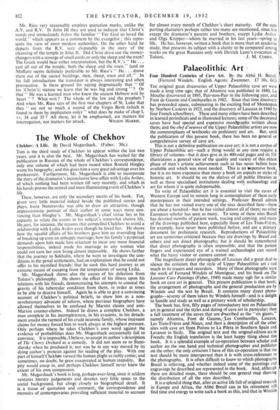The Whole of Chekhov
Chekhov: A Life. By David Magarshack. (Faber. 30s.) THIS is the third study of Chekhov to appear within the last two years, and it is also the best. Mr. Magarshack has waited for the publication in Russian of the whole of Chekhov's correspondence, only one volume of which had been issued when Ronald Hingley wrote his biography; and this gives him a very great advantage over his predecessor. Furthermore, Mr. Magarshack is able to incorporate the story of the dramatist's inconclusive love-affair with Lydia Avilov, of which nothing had been written till very recently, and which in his hands proves the central and must illuminating event of Chekhov's life.
These, however, are only the secondary merits of his book. For, given very little material indeed beside the published stories and plays, Irene Nemirovsky was able to draw an attractive, though impressionistic portrait of their author in some ways more con- vincing than Hingley's. Mr. Magarshack's chief virtue lies in his capacity to relate the events in his subject's somewhat elusive life. He fees, for instance, the reasons that compelled Chekhov to avoid a relationship with Lydia Avilov even though he loved her. He shows how the squalid affairs of his brothers gave him an overriding fear of breaking up even an unhappy marriage; how his family's perpetual demands upon him made him reluctant to incur any more financial responsibilities, indeed made his marriage to any woman who could not earn her own living almost impossible. He shows further that the journey to Sakhalin, where he went to investigate the con- ditions in the penal settlements, had an explanation that he could not offer to his mystified friends: that he took this hard journey as an extreme means of escaping from the temptations of seeing Lydia.
Mr. Magarshack shows also the causes of his defection from Tolstoi's philosophy. He shows the effect of his illness upon his relations with his friends, demonstrating his attempts to conceal the gravity of his tubercular condition from them, in order at times to be able to deceive himself. Again he is able to give a convincing account of Chekhov's political beliefs, to show him as a non- revolutionary advocate of reform, where previous biographers have allowed themselves to be confused by Marxist claims and anti- Marxist counter-claims. Indeed he draws a complete Chekhov, a man complete in his incompleteness, in his evasions, in. his detach- ment amidst the turmoil of his crude neurotic family, whose incessant claims for money forced him to work always at the highest pressure. Only perhaps where he takes Chekhov's own word against the evidence of probabilities does Mr. Magarshack occasionally fail to convince. It is impossible, I believe, to accept its author's description of The Cherry Orchard as a comedy. It did not seem so to Stani- slaysky when he produced it, nor was he in any way moved by its dying author's protests against his reading of the play. With one part of himself Chekhev viewed the human plight as richly comic; and sometimes, no doubt, he grew exasperated at human stupidity. But pity would creep in, and perhaps Chekhov himself never knew the extent of his own compassion.
Mr. Magarshack's book is long, perhaps over-long, since it seldom ventures literary judgements and devotes very little space to the social background, but clings closely to biographical detail. It is a tissue of quotation and comment, the correspondence and memoirs of contemporaries providing sufficient material to account for almost every month of Chekhov's short maturity. Of the sup. porting characters perhaps rather too many are mentioned, since few except the dramatist's parents and brothers, except Lydia Avilov and Olga Knipper—whom he married in his last years—spring to life. He has, howevev, written a book that is more than an academic study, that presents its subject with a clarity to be compared among works on the great Russians only with Derrick Leon's evocation of


































 Previous page
Previous page